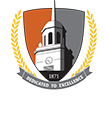FITT Academy 2018
Faculty Projects
Robin O'Dell
Mathematics
Providing Interactive Remediation and Support via Adobe Captivate
To provide an out-of-class online support system that allows underprepared students to self-remediate in advance of face-to-face classes, and enable all students-in-need to access additional instructional experiences that support the learning outcomes of face-to-face classes after they occur. Both purposes will be met via a next generation LMS, Adobe Captivate. I envision a seamless integration of interactive content and assessment that utilizes gamification principles and badges to encourage and reward participation. This project will merge the existing disparate online videos, materials & assessments already used in my course into a streamlined personalized experience for each student, taking them from remediation/preparation to mastery, in combination with the face-to-face class.
Imagine a dashboard indicating your progress on a set of prereqs. You choose a prereq to work on & experience tasks to develop meaningful understanding. Successful completion of each prereq’s tasks generates a badge, signifying your readiness for the upcoming face-to-face class. After the face-to-face class, you continue with a new set of indicators linked to the class session learning outcomes, again working toward a badge, this time indicating mastery of the content. This technology use will provide a more efficient, engaging, and effective pre-class experience that is targeted toward ameliorating the ill-preparation many students exhibit, while also providing a means to highlight in-class experiences after the face-to-face class to make mastery of content more likely.
Team Lead: Tim Sager
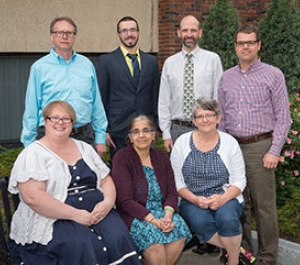
Nirmala Nutakki
Mathematics
Digital E-learning Modules to Support the Learning of Elementary Mathematics Content by Pre-Service Teachers
My goal is to create integrated online learning modules in Adobe Captivate. Module will consist of a sequence of problems that build concrete and intuitive understandings & gradually increase in difficulty and culminate in abstract perspectives. Problems will be completed by students prior to class. After class, they will watch or read a summary of the content from class and check their answers to the activities they completed in class. Students will then complete an interactive quiz with customized feedback. If student gives an incorrect answer they are taken back to the slide where the content was taught & then returned to quiz to retry the problem. The end result of this project will be hybrid MAT 122 course, which has an in-class component and an out-of-class Adobe Captivate component.
There are a plethora of math videos on the Internet. Unfortunately, most of them focus on teaching the steps in a mathematical procedure instead of developing conceptual understanding or providing opportunities to develop mathematical reasoning. Students often memorize a process to find an answer and can rarely explain the rationale behind their work. Like any complex activity, mathematics is best learned when students are actively engaged in the learning process instead of passively watching/re-watching videos. One of the difficulties in teaching math is bridging the various gaps that students bring to the classroom. Adobe Captivate provides an integrated e-learning environment that provides customized content and feedback to students instead of a one-size-fits-all approach to learning.
Team Lead: Jeanine Moyer
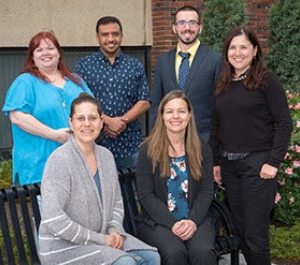
Kathleen McNerney
Speech-Language Pathology
The Use of Badges to Increase the Knowledge of Graduate Students in the Speech-Language Pathology Department
This project provides students the opportunity to expand on the knowledge obtained in a traditional clinical setting. Specialized modules will be created for students to complete additional requirements such as readings, research papers & independent learning assignments. They will earn a badge which will certify their advanced knowledge on a particular topic. It will incorporate pilot modules, with the goal of expanding to several specialized topics that are not or briefly covered, in our curriculum. Certificates could be awarded to those who complete several modules in an area. Supervisors may require that a specific module be completed prior to allowing that student to work with a particular client, or to be considered for placement at a clinical site.
Through the use of specialized badges and certificates, students would have the opportunity to gain knowledge on specialized topics that cannot be covered in great detail due to the magnitude of information that needs to be presented in a two-year time period. These modules/badges could also be used to provide students with the opportunity to gain knowledge prior to being placed at a clinical site that specializes in a specific area.
Team Lead: Kari D'Amico
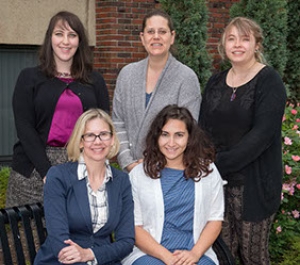
Andra Nikischer
Adult Education
Increasing Engagement and Retention by Adding Gamification to an Online Graduate Course
My FITT Academy Project will transform the course ADE 500: Introduction to Adult Education by adding gamification. All students in the Adult Education Graduate Certificate Program and in the Adult Education M.S. program must complete ADE 500 in their first semester of study. The course provides a foundation of knowledge and competencies that are required for success in the adult education graduate program and the adult education field. I will add gamification in the form of badges and the "unlocking" of content in order to ensure mastery of these important concepts and skills.
Incorporating gamification into ADE 500 will provide me with additional tools to engage students in their learning. Adding badges and the unlocking of content will help to reassure and motivate students by allowing them to see concrete evidence of their successes early and often. It will also provide me with a mechanism to ensure students are mastering each of the specific content and skill areas required for success in the larger adult education graduate program and in the adult education field. Long-term goal: If adding gamification is successful in ADE 500, I will add gamification to the final course in the Adult Education M.S. program, ADE 695: Methods and Techniques of Educational Research.
Team Lead: Katie Malik
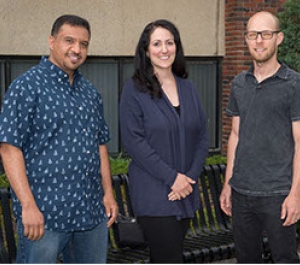
Lisa Rafferty
Exceptional Education
Increasing Student Engagement and Individualized Feedback in an e-Learning Environment
I would like to further investigate and incorporate Adaptive Learning Technologies into my online EXE 501 course. Within this course, student need to learn about basic statistics, a variety of tests, and how to interpret those test to report to stakeholders and make educational decisions. Some of the fact-based information is necessary in order for students to use clinical decision making to identify appropriate practices. Often, some students need remediation with the math and basic interpretation of results. Therefore, I believe that Adaptive Learning Technologies would be useful to these students. In particular, I think that adaptive content and/or adaptive assessment tools would be beneficial in this course.
Candidates would benefit from the real-time feedback they'd receive from adaptive content tools. The feedback would ensure that candidates weren't practicing errors, and it would provide immediate feedback that is individualized. This would even be useful if I were to teach this course hybrid using a flipped classroom model. In terms of using the adaptive assessment tools, the scaffolding would be beneficial to students. Gearing questions towards their individual level of learning proficiency would also help individualize instruction, and it would also create learning momentum.
Team Lead: Andy Chambers
Core Team
Meghan Pereira
Andy Chambers
Brooke Winckelmann
Kristine Kaminsky – Administrative Support
Khaleel Gathers – Project Management
Jason Overholt – Purchasing/licensing consultation
Project Team Participants
Ali Alhobabi
Matt Amerosa
Todd Benzin
Rebecca Catalano
Kari D’Amico
Julie Dewind
Katie Malik-Willard
Jeanine Moyer
Joe Riggie
Tim Sager
Emi Seliger
Kaylene Waite
Brooke Winckelmann
